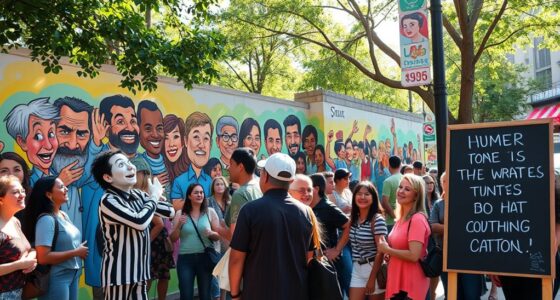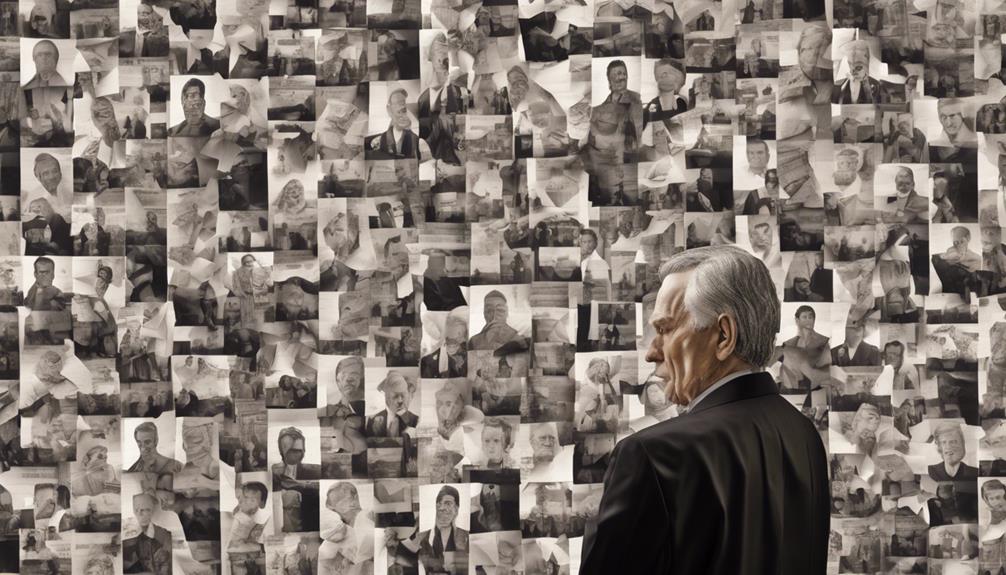Conspiracy theories gain traction because human brains naturally seek patterns and are biased to confirm what they already believe. Social media and online communities amplify these ideas by creating echo chambers, making it easier to share and endorse false information. Emotions like fear and anger make these theories more memorable and persuasive. The digital environment accelerates their spread, reinforcing group beliefs. Want to understand how these factors work together? Keep exploring to see the full picture.
Key Takeaways
- Human cognitive biases like pattern recognition and confirmation bias make conspiracy theories more believable.
- Social validation through sharing reinforces belief and creates echo chambers that amplify theories.
- Social media enables rapid, widespread dissemination, facilitating the growth of conspiracy communities.
- Emotional appeals and simplified explanations evoke strong feelings, increasing memorability and acceptance.
- Cognitive shortcuts and digital environments accelerate the spread and perceived credibility of conspiracy theories.

Have you noticed how conspiracy theories seem to be spreading faster than ever? It’s not just your imagination; there are real reasons behind this surge. One key factor is the way psychological biases shape your perception and decision-making. Human minds are wired to seek patterns, even where none exist, which makes you more susceptible to connecting dots that support a conspiracy theory. Confirmation bias, for example, causes you to favor information that aligns with your existing beliefs while dismissing evidence to the contrary. This bias makes it easy for conspiracy theories to flourish because you tend to interpret new information in a way that reinforces your suspicions, rather than challenging them.
Social influence also plays a major role in why these theories gain traction. When you see others sharing or endorsing a conspiracy theory, it creates a sense of social validation. You’re more likely to believe and spread the theory if it’s widely accepted within your social circles or online communities. The desire for social belonging and acceptance can override critical thinking, pushing you to adopt beliefs that might seem outlandish to outsiders. Social media amplifies this effect, allowing misinformation to spread rapidly and giving you constant exposure to like-minded individuals who reinforce your views. This environment fosters echo chambers, where dissenting opinions are silenced, and conspiracy theories are reinforced through group consensus.
Social media creates echo chambers that amplify conspiracy theories and silence dissenting opinions.
Additionally, the emotional appeal of conspiracy theories makes them more memorable and persuasive. When you encounter a theory that evokes strong emotions—fear, anger, or outrage—it becomes more ingrained in your memory, making you more likely to believe and share it. These theories often provide simple explanations for complex issues, giving you a sense of control or understanding amid chaos. They tap into your underlying fears and anxieties, offering a sense of certainty where official narratives might seem confusing or unreliable. This emotional hook, combined with psychological biases and social influence, creates a powerful recipe that makes conspiracy theories sticky and appealing.
Furthermore, the rise of digital platforms has drastically increased the speed and reach of such theories, enabling them to spread to a global audience instantly. In essence, your biases, driven by cognitive shortcuts, and the social dynamics that surround you, work together to make conspiracy theories more believable and contagious. Recognizing these influences is the first step in questioning their validity and resisting the urge to accept unverified claims. Understanding why these theories spread so easily can help you stay more grounded and critical amid the flood of information in today’s digital age.
Frequently Asked Questions
How Do Social Media Algorithms Influence Conspiracy Theory Spread?
Social media algorithms influence conspiracy theory spread by promoting content that engages users, often amplifying misinformation. You might notice that once you view or interact with conspiracy posts, the algorithm feeds you more similar material, creating echo chambers. This targeted content increases misinformation spread, as algorithms prioritize sensational or controversial ideas, making it easier for conspiracy theories to gain traction and reach a wider audience without critical scrutiny.
What Psychological Traits Make Individuals More Susceptible to Conspiracies?
You’re more susceptible to conspiracies if you have strong trust issues and are influenced by cognitive biases like confirmation bias. When you doubt official stories, you’re drawn to alternative explanations that reinforce your beliefs. Cognitive biases lead you to seek patterns or assign blame, making conspiracy theories seem convincing. Trust issues make you vulnerable because you’re less likely to question sources that align with your fears or suspicions, fueling your belief in hidden agendas.
How Do Cultural Differences Affect Conspiracy Theory Acceptance?
Cultural differences shape how you perceive and accept conspiracy theories, acting like lenses through which you interpret the world. In cross-cultural communication, belief systems vary widely, making some groups more prone to trusting certain ideas. If your community values skepticism or collective narratives, you’re more likely to adopt theories that align with those views. These cultural filters influence your openness and shape the stories you believe, creating a tapestry of varied acceptance worldwide.
Can Education Reduce Belief in Conspiracy Theories Effectively?
Yes, education can effectively reduce belief in conspiracy theories. By enhancing your critical thinking skills, you learn to analyze information more carefully and question sources. Media literacy also helps you identify misinformation and recognize biased or false content. When you actively apply these skills, you’re less likely to accept conspiracy theories at face value. Education empowers you to think critically and evaluate evidence, making you less susceptible to misleading or false claims.
What Role Does Fear Play in the Popularity of Conspiracy Theories?
Fear plays a significant role in the popularity of conspiracy theories by amplifying paranoia and cultivating mistrust. When you feel anxious or uncertain, you’re more likely to seek explanations that confirm your suspicions. Conspiracy theories thrive on this fear, as they deepen your mistrust of authorities and mainstream information sources. This cycle of paranoia amplification makes it easier for these theories to spread and gain traction among those seeking reassurance or answers.
Conclusion
So, next time you’re scrolling through wild theories, remember—you’re just a click away from joining the secret society of the enlightened. Conspiracy theories thrive on your curiosity, your doubt, and your desire to feel special. It’s all a big game, and honestly, you’re the star player. So go ahead, embrace the chaos, and enjoy the ride—who knows, maybe someday you’ll uncover the truth, or maybe you’ll just find another rabbit hole to fall into.









